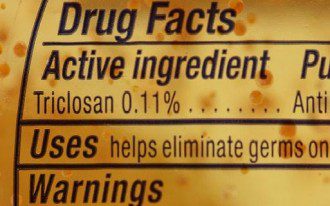By Elisha McFarland ND
Guest Writer for Wake Up World
Triclosan, found in common “antibacterial” products, is linked to impaired muscle function and hormone disruption.
If you take a look at the label on your anti-bacterial soap, you may see the chemical triclosan listed. If you haven’t heard of triclosan, you should know that is in a number of home and personal care products that you may be using on a daily basis.
Triclosan was introduced to the marketplace in 1972, although it was originally developed and registered as a pesticide in 1969. (1) At that time it was used in hospitals and health care settings for its antibacterial properties.
Today, triclosan is found in numerous products such as: soaps, hand-washes, dish-washing products, laundry detergents, plastics (e.g., toys, cutting boards, kitchen utensils) toothpaste and mouth washes, deodorants and antiperspirants, cosmetics and shaving creams, acne treatment products, hair conditioners, bedding, trash bags, socks and undershirts, hot tubs, plastic lawn furniture, impregnated sponges, surgical scrubs, implantable medical devices — and pesticides. (2)
Triclosan can also appear in products branded Microban®, Irgasan® (DP 300 or PG 60), or on products labeled “built-in antimicrobial protection.” Some antibacterial soaps use triclosan’s cousin, triclocarban in place of triclosan.
Why should I be concerned about triclosan?
A study led by researchers at UC Davis concluded that triclosan hinders muscle function in both animals and humans. In recent years additional studies have shown that this chemical poses a number of health risks.
Triclosan disrupts the endocrine system, especially reproductive hormones.
Triclosan penetrates the skin and enters the bloodstream easier than previously believed.
Triclosan showed up in the urine of 74.6 % of people tested.
Triclosan is showing up in breast milk, passing health risks on to newborns.
Triclosan impairs muscle function.
According to a study published at PNAS (Proceedings of the National Academy of Sciences of the United States of America), the commonly used antimicrobial additive triclosan is a liver tumor promoter.
Dr. Isaac Pessah, of the Department of Molecular Biosciences at UC Davis, as well as the study’s lead author, states “Its production levels are quite high, and the levels in humans have been increasing since it was first used as an antibacterial agent in the early ‘70s. So the body levels in humans including plasma, urine and breast milk – have been steadily increasing.” (3)
Co-author Nipavan Chiamvimonvat adds “Although triclosan is not regulated as a drug, this compound acts like a potent cardiac depressant in our models.” Chiamvimonvat went on to say “In patients with underlying heart failure, triclosan could have significant effects because it is so widely used,” he added “However, without additional studies, it would be difficult for a physician to distinguish between natural disease progression and an environmental factor such as triclosan.” (4)
In conclusion
I see no benefit in using anti-bacterial soaps in the home. In fact the FDA said in a press release, “There is currently no evidence that they are any more effective at preventing illness than washing with plain soap and water. Further, some data suggest that long-term exposure to certain active ingredients used in antibacterial products — for example, triclosan (liquid soaps) and triclocarban (bar soaps) — could pose health risks, such as bacterial resistance or hormonal effects.” (5) To be honest I have no desire to use a product that contains an ingredient that is classified as a pesticide. (1)
How do I avoid products that contain triclosan?
- Become a label reader.
- Avoid buying any products labeled “built-in antimicrobial protection”.
- Don’t but products that list triclosan or triclocarban on the ingredients label.
- Use organic or homemade cleaning products.
- Verify the safety of your products by using EWGs data base
Where can I find soaps and hand sanitizers that are free of triclosan?
Learn more:
References:
- www.archive.epa.gov/pesticides/reregistration/web/html/triclosan_fs.html
- www.tufts.edu/med/apua/consumers/personal_home_21_4240495089.pdf
- www.foxnews.com/health/2012/08/14/chemical-in-many-antibacterial-soaps-linked-with-impaired-muscle-function
- www.news.ucdavis.edu/search/news_detail.lasso?id=10301
- http://www.fda.gov/NewsEvents/Newsroom/PressAnnouncements/ucm378542.htm
Additional References:
- www.cdc.gov/biomonitoring/Triclosan_FactSheet.html
- www.pnas.org/content/109/35/14158.abstract
- www.fda.gov/ForConsumers/ConsumerUpdates/ucm378393.htm
- www.epa.gov/pesticides/reregistration/triclosan/triclosan-questions.htm
- www.householdproducts.nlm.nih.gov/cgi-bin/household/brands?tbl=chem&id=75&query=triclosan&searchas=TblChemicals1&prodcat=all
Previous articles by Elisha:
- Amalgam Fillings Release Mercury Vapor Into Your Body 24/7
- Understanding Food Labels
- How to Create A Healthy Non-Toxic Bedroom
About the author:
Elisha McFarland N.D., D. A. Hom., CWR., M.H. is the founder of My Health Maven. Elisha turned her debilitating illness from mercury poisoning into a dedicated passion to helping others. The My Health Maven website covers a wide range of topics including non-toxic living, health tests at home, the healing power of foods, home remedies, food ingredients, dental health and environmental illness. Her goal is to share her experience and knowledge, to help others live life more abundantly.
Elisha’s articles are widely published throughout alternative media such as The Organic Consumer’s Association and Food Matters TV. She is also a contributor to GreenMedInfo, Natural Health 365, The Hearty Soul and Eat Local Grown.
You can connect with Elisha at her website myhealthmaven.com or Facebook.com/myhealthmaven.

If you've ever found value in our articles, we'd greatly appreciate your support by purchasing Mindful Meditation Techniques for Kids - A Practical Guide for Adults to Empower Kids with the Gift of Inner Peace and Resilience for Life.
In the spirit of mindfulness, we encourage you to choose the paperback version. Delve into its pages away from screen glare and notifications, allowing yourself to fully immerse in the transformative practices within. The physical book enriches the learning process and serves as a tangible commitment to mindfulness, easily shared among family and friends.
Over the past few years, Wake Up World has faced significant online censorship, impacting our financial ability to stay online. Instead of soliciting donations, we're exploring win-win solutions with our readers to remain financially viable. Moving into book publishing, we hope to secure ongoing funds to continue our mission. With over 8,500 articles published in the past 13 years, we are committed to keeping our content free and accessible to everyone, without resorting to a paywall.








